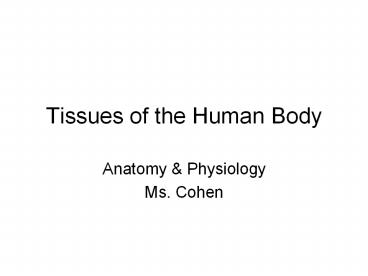Tissues of the Human Body - PowerPoint PPT Presentation
Title:
Tissues of the Human Body
Description:
Tissues of the Human Body Anatomy & Physiology Ms. Cohen Four main kinds of tissues Epithelial - covers the body and many of its parts, lines some parts of body ... – PowerPoint PPT presentation
Number of Views:263
Avg rating:3.0/5.0
Title: Tissues of the Human Body
1
Tissues of the Human Body
- Anatomy Physiology
- Ms. Cohen
2
Four main kinds of tissues
- Epithelial - covers the body and many of its
parts, lines some parts of body, closely packed,
continuous sheets - Connective - most abundant and widely
distributed, most variability, found in skin,
membranes, muscle, bones, nerves, internal organs - Muscle - movement specialists, higher degree of
contractibility than any other tissue - Nervous - rapid communication b/t structures and
control of body functions.
3
Epithelial Subdivision
- If categorized by Shape of Cells
- Squamous (flat and scalelike)
- Cuboidal (cube shaped)
- Columnar (higher than they are wide
- Transitional (varying shapes that can stretch
- If categorized by Arrangement of Cells
- Simple (a single layer of cells of the same
shape) - Stratified (many layers of cells named for the
shape of cells in the outer layer)
4
Simple Squamous
You can see here how The cells are very flat And
are often found Lining body cavities.
Single layer of very thin and irregularly shaped
cells. Do you think substances can pass through
easily? Why?
5
Stratified Squamous
Why do you think this tissue type might be
perfect for protection?
6
Simple Columnar
What do you think these goblet cells might
contain?
Can be found lining inner surface of stomach,
intestines and areas of respiratory and
reproductive tracts.
7
Stratified Transitional
Traditionally found in body areas subjected to
stress such as wall of urinary bladder. What
stress do you think?
8
Pseudostratified
What purpose will these serve?
Single layer of tall cells that give appearance
of more than one layer. Attach to basement
membrane.
9
Simple Cuboidal
These cells form tubules (glands) for secretory
activity. Two types Exocrine - release through
a duct Endocrine - blood stream
10
Connective Tissue
- Areolar-most widely distributed. Glue for
internal organs. - Adipose or fat - stores lipids
- Fibrous - bundles of strong, collagen fibers
arranged in rows (tendons) - Bone-hard and calcified matrix
- Cartilage-firm plastic type matrix
- Blood-transportational and protective for body
- Hemopoietic - blood like tissue found in red
marrow in spleen, tonsils, lymph nodes. Forms
blood cells and lymphatic system cells.
11
Which type is which?
12
Muscle Tissue
Walls of heart that produce heartbeat. Voluntary
movement (attach to bones, eyeball
muscles) Found in organs, blood vessels, hollow
organs (intestines, GI tract, bronchioles,
intrinsic eyes-iris, arrectors in hair)
13
Nervous
Rapid communication between body structures and
control of body functions.
Supporting cells































